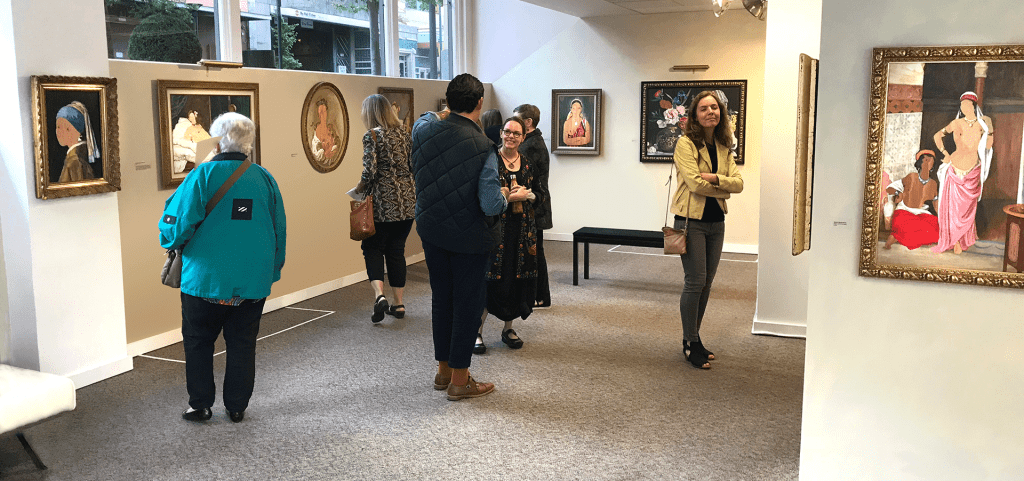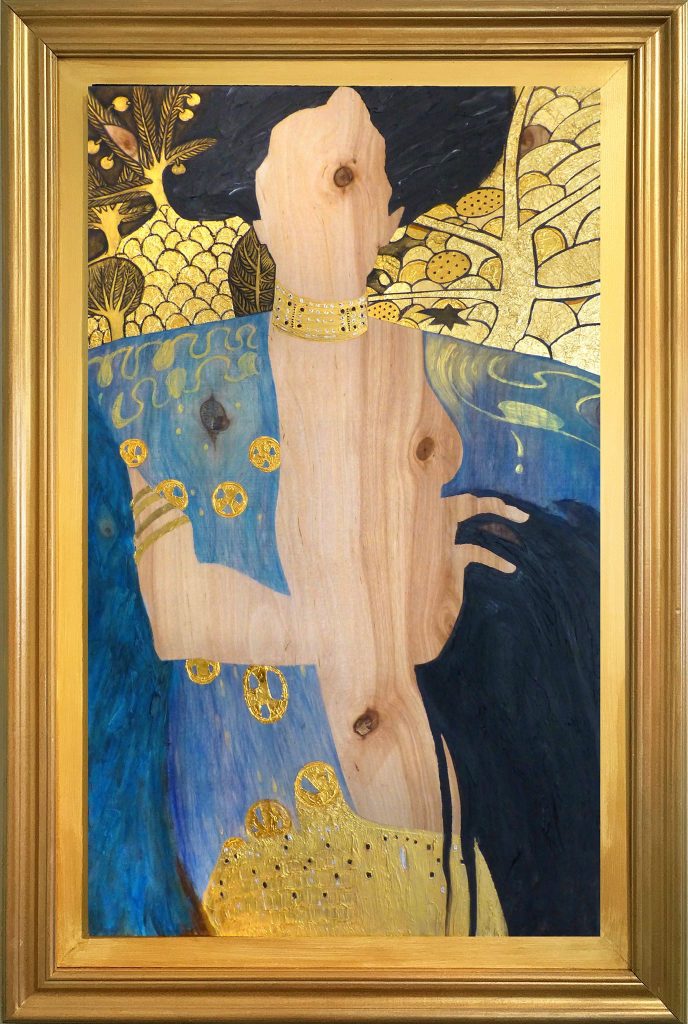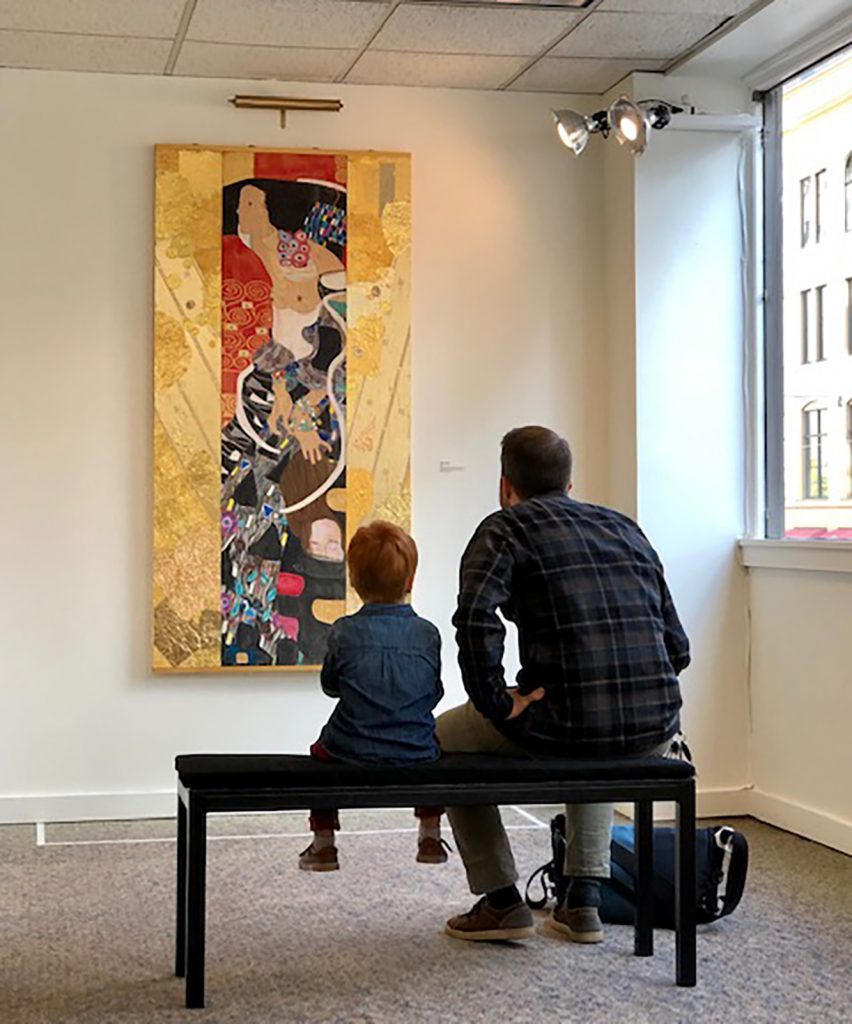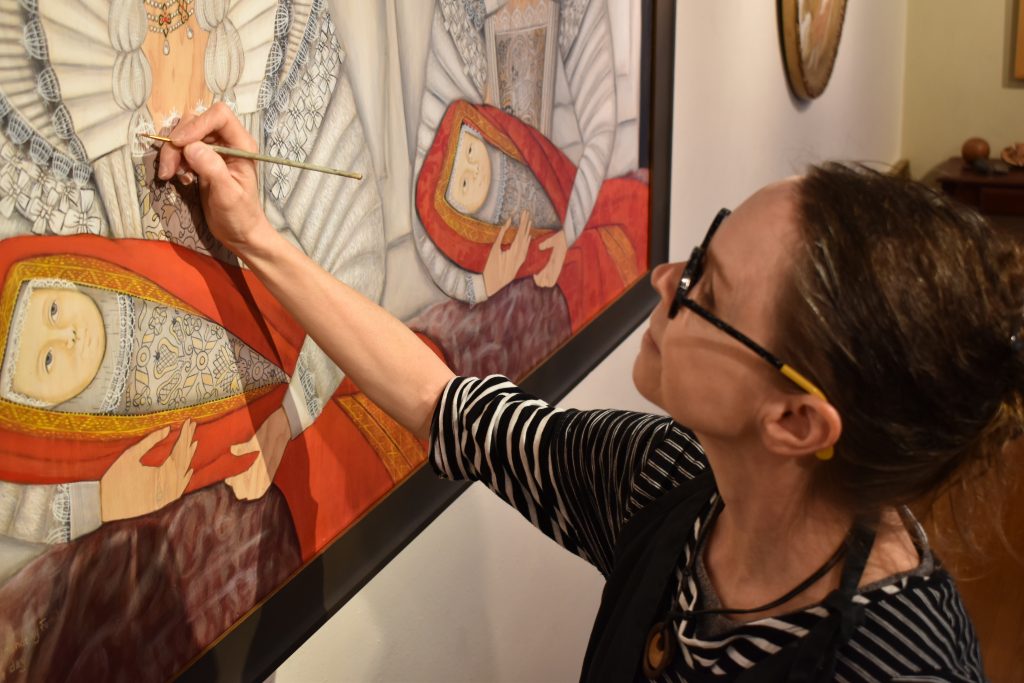A lifelong delight in art and a deep commitment to feminism have shaped of Lynette Charters’ way of seeing the world. Among the most recent recognitions of the Olympia painter’s talent: Two of her paintings will be included in Together, a national exhibition opening May 7 in Woodstock, Illinois. And she’s now included in All She Makes, a curated listing of female artists from all over the world that aims to increase the visibility of women in a field where their work is likely to be ignored.
That’s a mission Charters shares. Her nationally known “The Missing Women” series makes a powerful statement about the traditional place of women in art — as objects, not creators. She re-imagines well-known works with women’s flesh replaced by bare wood. Knots in the wood often represent nipples or eyes, but the female subjects are literally missing from the painted surface.

Four years and about 50 paintings after she began the series that portrays women’s bodies from a woman’s perspective, Charters is still at work on “Missing Women.” Charters explained, “It keeps tapping me on the shoulder, saying, ‘You’re not done with me yet.’ People are still buying them, and I still like making them.”
She’s thrilled to have been included in All She Makes. “It’s difficult to get in,” she said. “I was joyful to be included. … It’s important. I want to be able to support the group in its efforts to highlight women artists.”
That’s an effort that’s much needed. “Since women artists are extremely underrepresented in galleries and museums, talent searches leave an alarming majority of women artists undiscovered, unless organizations are committed to bringing equality into the art world,” according to the All She Makes website. According to the National Museum of Women in the Arts, 87 percent of the art in collections of 18 major U.S. museum was made by men and 85 percent by white artists. Women are also less likely to be able to make a living with their art. Women ear 70 percent of bachelor of fine arts degrees and 65-75 percent of master of fine arts degrees, but only 46 percent of working artists are women.

Charters’ latest Missing women, based on paintings of mothers tending to infants, spotlight another way that women are rendered invisible. She showed “The British School of Art’s Cholmondeley Muses” last year at Verum Ultimum Gallery in Portland. “Master of the Magdalen Legend” was included in South Puget Sound Community College’s 2020 SW Regional Juried Exhibition and will soon be shown at Together along with “Gauguin’s Young Muse Holding a Fruit.”
“Western society loves to idolize motherhood, as long as society doesn’t have to deal with it,” the artist said. “Take breastfeeding, for example. Women are told that ‘breast is best,’ yet we see objections to women breastfeeding their babies outside of their homes (and) failing providing a quiet, clean, comfortable and private space for women to do so.”
Charters has nearly finished a painting based on a Byzantine Black Madonna and Child painting, decorated with wrappers from chocolate coins to signify low wages. “Mothers struggle to bring up kids with the gender pay gap, and this goes more so for women of color,” She said. “(The fact) that she is missing completely from the painting indicates that, to the outside world, she is invisible in her work and her struggle.”
The images of motherhood are particularly resonant against the context of COVID-19, she pointed out. According to a report compiled by the Institute for Women’s Policy Research, the U.S. unemployment rate for women doubled during the pandemic. And women working from home were disproportionately affect by the closures of schools and child-care centers that left all parents scrambling to juggle multiple responsibilities. “Women have taken a step back in their careers,” Charters said. “Considering how a huge a problem this is, it is also underrepresented in the news.

Charters herself has found life at home a lot busier during the pandemic. She’s been thinking about a new series focusing on women in history whose accomplishments have been largely forgotten, but hasn’t begun work on it, because her house is full with husband John Serembe, son Yuri and adult daughter Tiffany, who moved in with her parents during the pandemic, all spending much of their time at home.
“We’re all kind of occupying the same space right now, and I came to the conclusion that I really can’t focus on a new series,” she said. “With The Missing Women series, I can drop in and out of it. I tried working on the new series, and I just needed more focus and more space. Primary caregivers are always kind of on call. When everyone’s at home, you’re aware that someone is probably going to ask you do something at some point.”
The pandemic paused most of the shows in which Charters was to have shown her work last year. It also temporarily halted her second art career — as curator of All Sorts Gallery, a pop-up located in the living and dining rooms of her home in the South Capitol Neighborhood. Allsorts’ last show was in December 2019.
“We’re going to start up as soon as it’s safe to do so,” Charters said. “If I had a separate physical gallery, I could probably do it with a limited number of people with masks.” She’s still planning to show all of the artists that had been on the schedule over the past year, beginning with Rene Westbrook. “It’s something that the community really loves, and we really love doing it,” she said.

